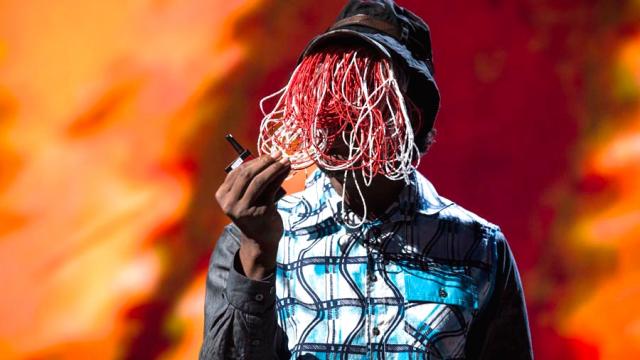
Anas Aremeyaw Anas, one of Africa’s most intrepid undercover journalists, has a range of tools he uses when he tries to expose corruption.
He owns an array of wigs, prosthetic masks and tiny cameras; once he feigned madness to infiltrate Ghana’s largest psychiatric hospital; and he has posed as characters ranging from street hawkers to an albino body parts trafficker. He has even dressed up as a rock to film cocoa smugglers along Ghana’s western border.
But Anas’s best disguise is his simplest: He plays himself.
The whistleblower’s “name, shame and jail” mantra has made him an underground hero but equally earned him powerful enemies, so he keeps his real identity secret. You’d be hard-pressed to find a photo of his face online, and the beaded masks he wears in public periodically spawn Twitter contests as to who can pull off the best “Anas look”.
He was wearing this mask when he turned up under heavy police protection at Ghana’s judicial council this month to answer a summons from the country’s top judge, Georgina Wood. Ironically, it was hundreds of hours – disguise-free – prowling the court’s corridors that led to the summons.
Anas had been working on a documentary featuring secretly filmed footage of 34 judges taking bribes. For two years he pretended to be a relative or friend of an accused, offering to pay judges in exchange for passing shorter sentences. Twelve high court judges and 22 lower court justices were filmed accepting money – and in one case, a goat.
The resulting film has rattled many in elite circles, with some judges attempting to block its release and one filing a suit calling for Anas to be imprisoned for contempt of court. Ghana’s attorney-general stepped in and granted Anas immunity from prosecution.
On the evening of the film’s first public screening recently, traffic tailbacks clogged the streets around the downtown venue in Accra, while those inside wondered if Anas was sitting unnoticed among them.
“The queues were really something else just to get inside the building. People really came from far to see this,” said Edwin Appiah, a student who attended. “It’s very discouraging that people who are in charge of upholding the law could be doing this kind of thing. The only good thing is that least some judges turned down the bribes, so we can still have some hope.”
“After an hour of viewing the Anas documentary ... I got up and left. It’s sad. Very sad,” tweeted another audience member, John Dumelo.
Ghana, one of the continent’s fastest-growing countries, ranks 61 out of 175 countries on Transparency International’s corruption index, well above neighbours such as Nigeria and Ivory Coast. But anti-graft campaigners say the situation is worsening.
“The phenomenon of corruption had become pervasive and continues to weaken the moral fibre of the country,” said Jean Mensa, head of thinktank the Institute of Economic Affairs, at a conference in Accra earlier this year. “If effective measures are not in place to check the menace now, it will completely overwhelm us and we can well wave goodbye to any effective fight against corruption.”
Born into a military family, Anas grew up in barracks in Ghana’s capital. He initially studied journalism at the University of Accra before deciding law would be a better way to tackle rampant corruption – eventually leaving with degrees in both law and journalism.
Documentary film-maker Ron McCullagh, who has partnered Anas on investigations, says the young Anas was horrified by the way soldiers would sometimes behave towards those they considered beneath them. On more than one occasion, he watched soldiers thrash taxi drivers who dared to complain that they hadn’t been paid their fares after dropping them at the barracks.
“He was appalled by this casual injustice,” McCullagh said. “Anas is totally driven by his belief that corruption is what’s holding Africa back.”
His targets are not only those at the highest level of society. During one investigation, Anas posed as a father of a disabled child – which was in fact a prosthetic baby that had taken months to build – to expose a rural herbalist suspected of poisoning unwanted children.
When the herbalist made to administer the potion, Anas signalled to policemen waiting outside and the man was arrested.
Anas’s whistleblowing produces results – those investigated have frequently been jailed, and Ghana’s mental health act was introduced in 2012 largely following an outcry sparked by his work. This has made him a marked man. At his non-descript office in downtown Accra, he has 24-hour security and during some investigations he sleeps in a different place each night.
“The threats are not imagined. They are real,” he told a journalist earlier this year. “When you are dealing with bad guys in the society and you take a swipe at them and you miss, you embolden them. I have no time for that. If I pick a story that I want to do, I do it well.”
3 WAYS TO SHOW YOUR SUPPORT
- Log in to post comments
















